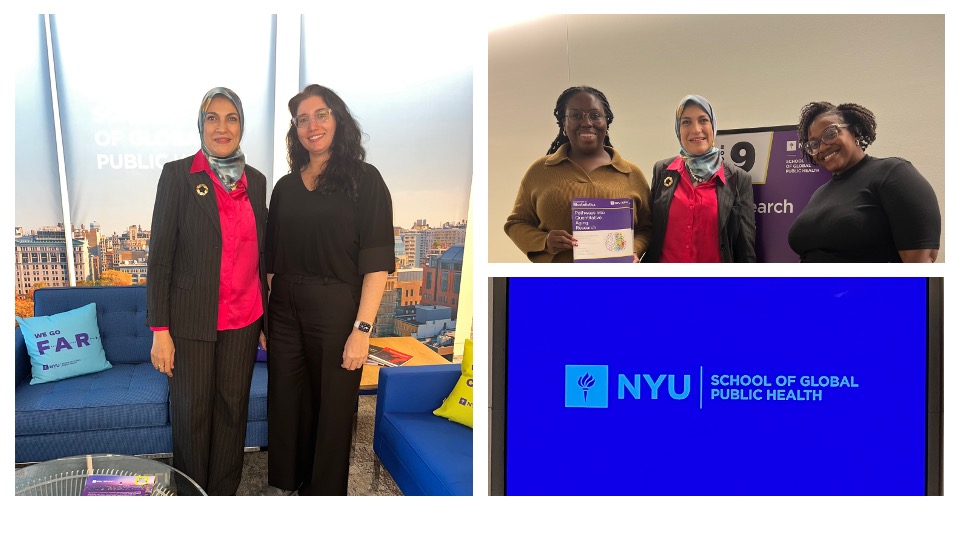This is a short reflection on my recent visit to New York University’s Center for Anti-Racism, Social Justice, and Public Health (CASJPH) at the School of Global Public Health in October 2024. During my time at CASJPH, I engaged in rich and insightful discussions with the centre’s staff, which included both faculty members and graduate students, all of whom share a passion for advancing health equity and addressing systemic injustices in healthcare.
The discussions focused on their shared research interests, particularly in critical areas such as long-term care, health equity, and the numerous challenges ageing populations face. I emphasized the unique healthcare needs of various population groups and communities, particularly older adults, highlighting disparities that often impede their access to essential medical services. Additionally, I underscored the importance of advocating for influential policy reforms to improve the quality of care and support systems available to older individuals.
Throughout my visit, I explored potential collaborations with CASJPH, seeking to merge our research interests and expertise with their mission to promote health equity. This alignment enables both parties to address the pressing issues surrounding ageing populations and explore innovative solutions that can bring tangible improvements in public health policy. The exchanges were not only intellectually stimulating but also strengthened the commitment of both organizations to advocate for the health needs of underserved population groups.

I have used this opportunity to share research findings and reflections from two current and recent projects. The first focuses on measuring unmet health and care needs among older people in the UK as part of the Policy Research Unit, Health and Social Care Systems and Commissioning (PRU-HSSC). The second reflects current research on workforce policy drivers from the ESRC Centre for Care, Research Group on the Care Workfoce.
Measuring Unmet Health Care Needs Among the Aged Population
Based on data analysis of the English Longitudinal Study of Ageing (ELSA), I shared some of our findings on the prevalence and evolution of unmet healthcare needs among older adults in the United Kingdom. Our research highlights that the ageing population is increasingly reliant on health and social care services due to rising life expectancy and advancements in health. The trends indicate a significant prevalence of unmet needs, particularly in mobility and daily living activities. We also observed regional disparities and a higher burden of unmet needs among older men. Factors such as geographic region, age, and socioeconomic status play a crucial role in these unmet needs, emphasising the need for targeted interventions to address these inequalities within healthcare systems.
Policy Tensions and Synergies in the Long-Term Care Workforce
This presentation examined the challenges and reforms affecting the long-term care workforce in the UK. I highlighted the tensions between policies aimed at professionalising care work and those focused on personalising care, often leading to conflicts in workforce expectations and outcomes. The study outlined key reforms, such as the integration of healthcare services and the requirement for mandatory training to enhance professionalisation. It also discussed the implications of a high turnover workforce experiencing poor employment conditions. Future scenarios were envisioned to improve workforce sustainability by addressing recruitment, retention, and care quality issues, emphasising the recognition of care work as critical national infrastructure.
International knowledge exchange opportunities such as this visit to CASJPH hold significant relevance for the MENARAH network, underscoring the importance of international cross-learning in developing policies tailored to the unique needs of ageing populations in the Middle East. By examining global research on healthcare inequities and long-term care workforce challenges, MENARAH can harness these insights to inform context-sensitive policy solutions prioritising equity in health outcomes among older adults. Collaborative learning from regions with established health equity frameworks can help MENARAH members advocate for policies that bridge disparities, improve care access, and support the well-being of older adults across diverse Middle Eastern communities.
Founder and Director
Shereen Husseinis a Health and Social Care Policy professor at the London School of Hygiene and Tropical Medicine (LSHTM), United Kingdom.
Shereen Founded the MENARAH Network in 2019, through an initial grant from the Global Challenge Research Fund, UKRI. She is a medical demographer with expertise in ageing, family dynamics, migration and long-term care systems. Shereen regularly collaborates with the United Nations, the World Health Organisation and the World Bank in policy and research focused on ageing in the Middle East and North Africa Region.
Shereen received her undergraduate degree in statistics and a postgraduate degree in computer science at Cairo University. She completed an MSc in medical demography at the London School of Hygiene and a PhD in quantitative demography and population studies at the London School of Economics and Political Science, United Kingdom.






